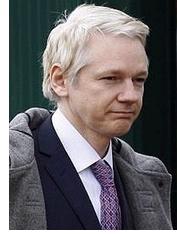Assange must go to Sweden
Judgment opens up new grounds for other appeals against extradition
 It's not looking good for Julian Assange. The high court's decision to dismiss his appeal against extradition to Sweden will have come as no surprise to him because his lawyers were sent a draft of the court's judgment at the end of last week.
It's not looking good for Julian Assange. The high court's decision to dismiss his appeal against extradition to Sweden will have come as no surprise to him because his lawyers were sent a draft of the court's judgment at the end of last week.
That's normal practice, and it should have enabled his lawyers to have applied immediately for permission to appeal to the supreme court. Sir John Thomas and Mr Justice Ouseley, the two high court judges who heard Assange's appeal, seemed rather disappointed that Assange's lawyers were not ready to do so.
This is not through any lack of ability on the part of his legal team. Although his QC, Ben Emmerson, is currently tied up with the cricket corruption trial, his junior counsel, Mark Summers, is a leading expert on extradition.
Summers reminded the judges that he had 14 days to lodge his client's application. But it would have looked better for Assange if his lawyer could, at least, have come up with a ground for appeal. Instead, the two high court judges said they would hold a short hearing in open court in about three weeks' time to decide whether he should have one more bite of the cherry.
Unless a case is of major importance, the lower courts normally refuse permission to appeal to the supreme court. In civil cases, that's not a major setback: the appellant can ask the supreme court itself for permission to appeal and this will be granted if it's a case that the court wants to hear.
But criminal cases are different. Section 32 of the Extradition Act 2003 makes it clear that leave to appeal must not be granted unless "the high court has certified that there is a point of law of general public importance involved in the decision". Unless Emmerson and Summers can persuade the two judges that a general point exists, they may find by the end of this month that they have exhausted all their avenues of appeal. Then, Assange's only hope of staying in the UK would be to persuade the European Court of Human Rights to take on his case and ask the British government to defer extradition.
Although the court dismissed all the arguments put by Assange's lawyers, they may take some comfort from a rather interesting passage in paragraph 17 of the judgment. This offers a new exception to the general principle of mutual recognition underpinning the European arrest warrant - that each European country respects the decisions of each other's courts without asking too many questions.
Thomas and Ouseley said that public confidence in the European arrest warrant would not be advanced unless the courts of the country that's being asked to hand over an accused person "scrutinise requests for surrender under the European arrest warrant with the intensity required by the circumstances of each case".
Failure to do so could risk undermining public confidence in the EU's "common area for justice," the judges stressed.
Having opened the door to a new type of challenge, the judges slammed it firmly in Assange's face. One of his argument was that the Swedish prosecutor who had sought his extradition was not a "judicial authority" in the sense of a judge or adjudicator - and was therefore not entitled to issue a European arrest warrant.
The high court was prepared to accept that a prosecutor could be a judicial authority. But, the court continued, a prosecutor was also a party to the proceedings. A warrant issued by a prosecutor should therefore be subjected to more intense scrutiny than a warrant issued by a judge.
However, the allegations against Assange had already been considered by a Swedish appeal court in Svea. That court had dismissed his appeal two days before the warrant was issued.
"In this case," said the two high court judges, "the action of the prosecutor has been subject to independent scrutiny by judges in Sweden which, as judges in another [EU] member state, we should accord due respect."
Assange's other grounds of appeal were dismissed with equal firmness, including his claim that he was not accused of an offence in Sweden. The fact that Swedish criminal procedure allowed him be questioned further before being charged was not decisive, the court said.
You couldn't look at a continental system "through the narrowest of common law eyes". If you viewed it "through cosmopolitan eyes", the court said, you could see that criminal proceedings against Assange had begun.
Assange simply refused to accept this aspect of the judgment in his brief response to reporters. So whatever other charms he may have, in the judges' view, he clearly doesn't have cosmopolitan eyes.
(Published by The Guardian - November 2, 2011)